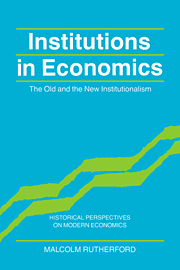3 - Individualism and holism
Published online by Cambridge University Press: 12 January 2010
Summary
The methodological problems associated with individualism and holism are particularly difficult to discuss. The terms have been at the centre of a long-running controversy in the social sciences, yet there is no agreed upon set of definitions. What is meant by “individualism” or “holism” often seems to vary with the writer, and, as will be seen later in the chapter, what the old institutionalist means by these terms does not always coincide with what the new institutionalist means. A great deal of effort, therefore, must be spent on defining more precisely the various positions taken.
Another difficulty is that the debate covers a number of separate but closely interrelated issues. The literature dealing with the more general methodological questions merges into that on the merits of specific approaches to social science, such as functionalism, game theory, and Marxism (Harsanyi 1968; Cohen 1982; Elster 1982; Roemer 1982), and on the use of the maximizing model of man as opposed to the more sociological, rule-following model (Meckling 1976; Brunner and Meckling 1977; Brunner 1987; Vanberg 1988). In order to isolate the main issues of concern here, this chapter will not deal with arguments relating specifically to Marxism. In addition, a discussion of the maximizing versus the rule-following model will be postponed to the next chapter.
Individuals and institutions
A great deal of confusion surrounds the debate over methodological individualism and holism. Methodological individualism is usually associated with the reductionist claim that all theories of social science are reducible to theories of individual human action.
- Type
- Chapter
- Information
- Institutions in EconomicsThe Old and the New Institutionalism, pp. 27 - 50Publisher: Cambridge University PressPrint publication year: 1994

